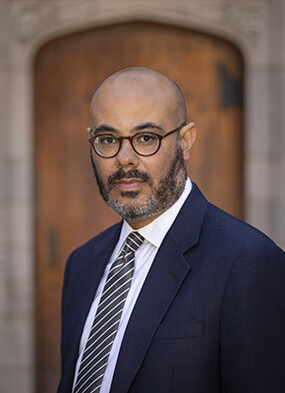Professor Driver Files Amicus Brief in Fourth Circuit Case

Robert R. Slaughter Professor of Law Justin Driver4 has filed an amicus brief in a major case before the U.S. Court of Appeals for the Fourth Circuit. The case addresses some of the most prominent cultural and legal issues of the day — public education, school curricula, and the quest for LGBTQ+ equality.

In Mahmoud v. McKnight, three sets of parents in Montgomery County, Maryland, and an advocacy group representing others, are asking the circuit court to reverse a lower court decision that upheld a school district policy. The policy prohibited parents from opting their children out of language arts curriculum featuring LGBTQ+ characters that they said violated their religious beliefs.
Elementary schoolers in the Montgomery County Public Schools (MCPS) district – the largest school system in Maryland – read storybooks as part of the curriculum. In October 2022, the School Board introduced a number of LGBTQ+ inclusive books for use in the classroom in response to years of requests to include books representing LGBTQ+ identities.
The school district originally tried to accommodate parents who objected to the books by allowing certain children to leave class while the books were read, but the brief submitted by the MCPS states that the solution “proved so unworkable and damaging to MCPS’s ability to fulfill its educational mission that principals approached MCPS for assistance.”
In March 2023, the MCPS adopted a policy to prohibit parents from opting out their children from instruction featuring books that they objected to, whether on secular or religious grounds.
The case before the appeals court will decide whether the district court was correct in concluding that the MCPS was not required to excuse children whose parents objected to the curriculum when LGBTQ+ characters were presented in the storybooks.
“Every court that has addressed the question has concluded that the mere exposure in public school to ideas that contradict religious beliefs does not burden the religious exercise of students or parents,” the district court ruling said.
Books objected to by the plaintiffs include titles like Pride Puppy!, about children who are reunited with their dog after he gets lost in a pride parade, and Prince and Knight, a picture book about a young prince who falls in love with a knight after they battle a dragon together.
The brief filed by the plaintiffs takes issue with the lower court ruling that was issued on Aug. 24.
“When it comes to teaching their elementary-age children about sexuality and gender transitioning, [parents] want to know. And they want the opportunity to opt their children out if the instruction violates their religious beliefs or is age-inappropriate,” the brief states.
In his amicus brief, Driver, an expert in constitutional and education law, says that the lower court ruling was correct and follows decades of judicial rulings.
Reversing the district court decision, moreover, “would empower parents to flyspeck every aspect of a public school’s curricular decisions, and would force schools to … offer bespoke lesson plans for each student in accordance with his or her parents’ particular religious views,” Driver says in the brief.
Driver further states that the Supreme Court has never issued decisions endorsing a right for parents to demand a school curriculum customized to their faith.
“The Court has … repeatedly emphasized the importance of local control over education, and has never endorsed Free Exercise theories that would shift that control from democratically elected officials to federal courts or inhibit constitutionally protected government speech,” Driver says in the brief. “[The Fourth Circuit] need not endorse the wisdom of [Montgomery County]’s curricular choices to recognize that local elected officials, rather than unelected judges, are best positioned to make them.”
Driver worked on the brief with a trio of lawyers from Sullivan & Cromwell LLP: Amanda Flug Davidoff, Daniel J. Richardson, and Cason J.B. Reilly.
The case has been covered extensively in the local and national press. The case will be argued at the Fourth Circuit on Dec. 5.
Driver teaches and writes in the area of constitutional law and is the author of The Schoolhouse Gate: Public Education, the Supreme Court, and the Battle for the American Mind. The book was selected as a Washington Post Notable Book of the Year and an Editors’ Choice of The New York Times Book Review. The Schoolhouse Gate also received the Steven S. Goldberg Award for Distinguished Scholarship in Education Law, and was a finalist for the American Bar Association’s Silver Gavel Award and Phi Beta Kappa’s Ralph Waldo Emerson Book Award.


